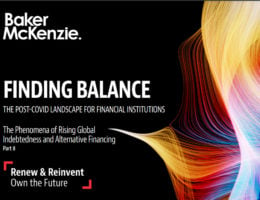The business models of financial institutions are changing: how services are delivered, the ways in which they can earn revenue and the search for new ways to monetize value. COVID-19 has accelerated the take-up of digital transformation due to the need to conduct more business remotely through digital channels. Simultaneously, customers have shown a greater willingness to use technologies in which previously they may have lacked confidence.
Read our ninth installment focused on the impact of new technology on financial institutions.
Baker McKenzie are now inviting you to join sessions on specific developments and areas of risk that are on the minds of risk managers and require forethought today. The Series is designed for legal and compliance as well as interested business leaders who want to invest 50 minutes every month to these topics and come away with ideas and practical guidance.
The risks arising from unsustainable indebtedness to which both traditional and alternative financing sectors have exposure are higher in emerging economies, where the debt burden is much more elevated generally and whose borrowers are more susceptible to default if (as is expected), US dollar interest rates rise. Emerging economies with less policy intervention, monitoring and regulation are more vulnerable than advanced economies. This eighth installment focuses on the phenomena of rising global indebtedness and alternative financing.
COVID-19 represents one of the greatest ever shocks to our economies and, in consequence, to the business models of financial institutions and the way they do business. While many changes to business processes and operations were already taking place prior to the pandemic, COVID-19 has given many added impetus and urgency. Decision-makers must choose between adapting a wait-and-see approach or implementing more proactive strategies to safeguard and, if possible, grow their businesses.
COVID-19 represents one of the greatest ever shocks to our economies and, in consequence, to the business models of financial institutions and the way they do business. While many changes to business processes and operations were already taking place prior to the pandemic, COVID-19 has given many added impetus and urgency. Decision-makers must choose between adapting a wait-and-see approach or implementing more proactive strategies to safeguard and, if possible, grow their businesses.
A COVID-19 represents one of the greatest ever shocks to our economies and, in consequence, to the business models of financial institutions and the way they do business. Decision-makers must choose between adapting a wait-and-see approach or implementing more proactive strategies to safeguard and, if possible, grow their businesses.
Baker McKenzie partnered with Risk.net in its annual ranking of the top operational risks for 2021. The report is based on a survey of 100 chief risk officers, heads of operational risk and senior practitioners at financial institutions, including banks, insurers, asset managers and infrastructure providers. These stakeholders chose their…
COVID-19 represents one of the greatest ever shocks to our economies and, in consequence, to the business models of financial institutions and the way they do business. While many changes to business processes and operations were already taking place prior to the pandemic, COVID-19 has given many added impetus and…
COVID-19 represents one of the greatest ever shocks to our economies and, in consequence, to the business models of financial institutions and the way they do business. While many changes to business processes and operations were already taking place prior to the pandemic, COVID-19 has given many added impetus and…
On 29 November 2020, Swiss voters opted for the introduction of EU-style ESG reporting and due diligence requirements and against the so-called Responsible Business Initiative. While the initiative would have added teeth to the civil liability regime for the violation of international human rights and environmental standards across the supply chain, the substantive requirements regarding ESG reporting and due diligence across the extended enterprise are not any lighter under the chosen approach. We expect that affected companies will have to apply the new requirements in financial year 2023.









